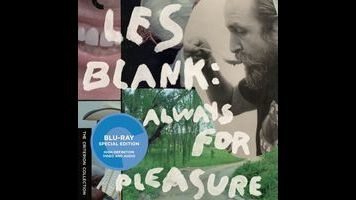Criterion collects the joyful, humane documentaries of Les Blank

Documentaries tend to be serious business, and that’s especially true to when it comes to the legends of nonfiction filmmaking—Frederick Wiseman, Albert and David Maysles, Errol Morris, etc. Les Blank, however, was a glorious anomaly. Active from the early 1970s right up until his death from cancer in April 2013, Blank seemed to view life as one never-ending party, to which he was always eager to invite an audience. Les Blank: Always For Pleasure, Criterion’s new three-disc collection, derives its title from one of Blank’s own movies, but those three words also serve as an accurate description of the man’s celebratory ethos.
Criterion had previously released Blank’s most revered feature, 1982’s Burden Of Dreams, an account of the making of Fitzcarraldo, along with the self-explanatory short “Werner Herzog Eats His Shoe.” Those two films aren’t included in Always For Pleasure. But, then, they wouldn’t really fit well in this almost-but-not-quite-comprehensive set, which maintains a joyous mood virtually from start to finish. Most of its 14 primary pictures (a few of Blank’s other shorts, offshoots of earlier works, are treated as supplements) focus on music, food, or (usually) both, with a special emphasis on the Cajun culture of southern Louisiana and a strong side interest in old blues guitarists from Texas. Fascinating as these films no doubt were when initially released, they now boast an even stronger anthropological interest, documenting American subcultures at a particular moment in history and capturing great, otherwise undocumented musicians—Lightnin’ Hopkins, Clifton Chenier, Tommy Jarrell, Mance Lipscomb—not long before their deaths.
Shooting mostly with the same collaborators (many of whom receive equal “a film by” credit with the director), always in the squarish Academy ratio, Blank paid little attention to commercial accessibility, even as he made movies that just about anybody can enjoy. None of the films on Always For Pleasure run longer than an hour, and many of the best clock in around 20 or 30 minutes—just enough time to make a vivid impression without wearing out their welcome. “God Respects Us When We Work, But He Loves Us When We Dance” from 1968 is somewhat atypical in that it doesn’t focus on an individual, but there may be no better portrait of the Summer Of Love than this deftly edited record of a Los Angeles “love-in,” which starts out frenetic, slows practically to a standstill, then builds to a euphoric crescendo. Likewise, “Gap-Toothed Women,” at half an hour, mines just the right amount of humor and anecdotal ardor from its oddball subject. Today’s equivalent would run 85 minutes and be insufferable.
A lifelong gourmand, Blank was more than willing to literally show how the sausage is made—an act lovingly depicted in no fewer than four different films here. Garlic Is As Good As Ten Mothers, shot mostly around Gilroy, California, remains one of his most popular pictures, and the truly dedicated may want to duplicate a strategy Blank used at some screenings, roasting garlic during the movie so that the aroma eventually becomes overpowering. (Odorama!) Just the sight of all the bubbling pots in the Cajun-set material, though, will fire up salivary glands. Even in the films that explicitly profile musicians, food is a constant; Always For Pleasure itself, made in 1978, interviews such legends as Allen Toussaint and Irma Thomas—not about their music, but about their favorite New Orleans recipes. (Fans of Treme should be sure to check out that one, which captures Mardi Gras Indians and second-line dancing in the late ’70s.)
What mostly comes across in Blank’s work, though, is his sheer love for humanity, and especially for people dwelling on the margins of society. Scenes of musicians playing are interspersed with scenes in which they just sit around chewing the fat with friends and relations (often in a dialect thick enough to require subtitles), and it all seems part of a continuum. There are moments in nearly every film that have to be seen to be believed—one, in which a Louisiana man casually pulls his own tooth with a pair of pliers during a barbecue (from “Spend It All,” 1971), so inspired Herzog that he later recreated the scene in Stroszek—but they’re balanced by moments of natural warmth and beauty, captured by a camera that functions like an endlessly inquisitive friend. At the end of 1983’s “Sprout Wings And Fly,” a young woman asks fiddler Tommy Jarrell who’s making a film about him. “That man right there,” Jarrell replies, pointing to the lens. “Les Blank, he’s from California.” (“Did they get a grant or something?” she then asks in response, to which a list of all the film’s funding sources are superimposed onto her perplexed face. Best closing-credits gag ever? It’s in the running.) Though Blank almost never appears onscreen, and is rarely even heard speaking, his presence is deeply felt nonetheless. His surname is a misnomer.
Les Blank: Always For Pleasure is available on DVD and Blu-ray from Criterion. Many of the films are also available to stream on Hulu Plus.